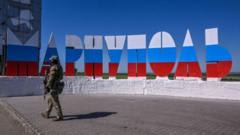Rebuilding Mariupol: The Complex Road from Devastation to Recovery
 The Tech Times
The Tech Times
The echoes of war are still palpable in Mariupol—a city that has become a haunting symbol of the ongoing conflict between Russia and Ukraine. With the dust barely settled from a brutal siege in 2022, Russian authorities now claim to be restoring the city to its former glory. However, the narratives coming out of Mariupol are starkly contradictory, with many residents dismissing these claims of normalcy. This juxtaposition paints a complex picture of the region's road to recovery and the broader geopolitical implications.
A City Under Siege
The siege of Mariupol in 2022 was not just any military operation; it was an intense and prolonged assault that left the city in ruins. The strategic importance of Mariupol cannot be overstated—it serves as a critical port on the Sea of Azov and a key industrial hub. The city's capture was a significant objective for Russian forces, aiming to secure a land corridor to Crimea and further isolate Ukraine from the Black Sea.
The siege brought not only physical destruction but also a humanitarian crisis. Residents faced dire shortages of food, water, and medical supplies, while relentless shelling obliterated infrastructure and homes. The psychological scars of this period linger, complicating efforts to move on and rebuild.
The Rebuilding Narrative
Fast forward to the present, and Russian authorities are promoting a narrative of reconstruction and revitalization. They assert that efforts are underway to restore infrastructure, rebuild housing, and return the city to a semblance of normal life. On the surface, this might appear as a positive development, a step towards peace and stability in a war-torn region.
However, these claims face skepticism from many residents still grappling with the aftermath of the siege. Reports from the ground suggest that the pace of reconstruction is slow, and many areas remain uninhabitable. The discrepancy between official statements and the lived experiences of Mariupol's citizens raises questions about the true state of recovery.
Historical Context and Modern Implications
To understand the situation fully, it's essential to place Mariupol's current condition within a broader historical context. The conflict in Ukraine is rooted in complex geopolitical dynamics, with Crimea's annexation by Russia in 2014 serving as a significant flashpoint. Mariupol's strategic location means it has often been caught in the crossfire of these larger power struggles.
Moreover, the rebuilding of Mariupol is not just a local issue but a microcosm of the broader tensions between Russia and the West. The city's fate is intertwined with international diplomatic efforts, sanctions, and negotiations aimed at resolving the conflict. As such, the situation in Mariupol is a litmus test for the effectiveness of international responses to aggression and the protection of sovereign nations.
The Path Forward
The road to recovery for Mariupol is undoubtedly fraught with challenges. For genuine progress, the rebuilding efforts must go beyond mere infrastructure. They must address the deep-seated trauma and economic hardship faced by the residents. Furthermore, transparency and collaboration with international bodies could foster a more trustworthy narrative, bridging the gap between official claims and reality.
Ultimately, the future of Mariupol hinges on a broader resolution to the conflict in Ukraine. As long as geopolitical tensions persist, the city's recovery will remain precarious. However, the resilience of Mariupol's residents offers a glimmer of hope. Their determination to rebuild their lives amidst adversity is a testament to the human spirit's capacity to endure and overcome.
In conclusion, the story of Mariupol is not just about a city's physical reconstruction but about healing a community and finding a path to lasting peace. The world watches, hoping that Mariupol can rise from the ashes and serve as a beacon of resilience in a region marred by conflict.
Source: 'Mariupol is diseased': Residents deny Russian claims occupied city returning to normal
Subscribe to my newsletter
Read articles from The Tech Times directly inside your inbox. Subscribe to the newsletter, and don't miss out.
Written by
